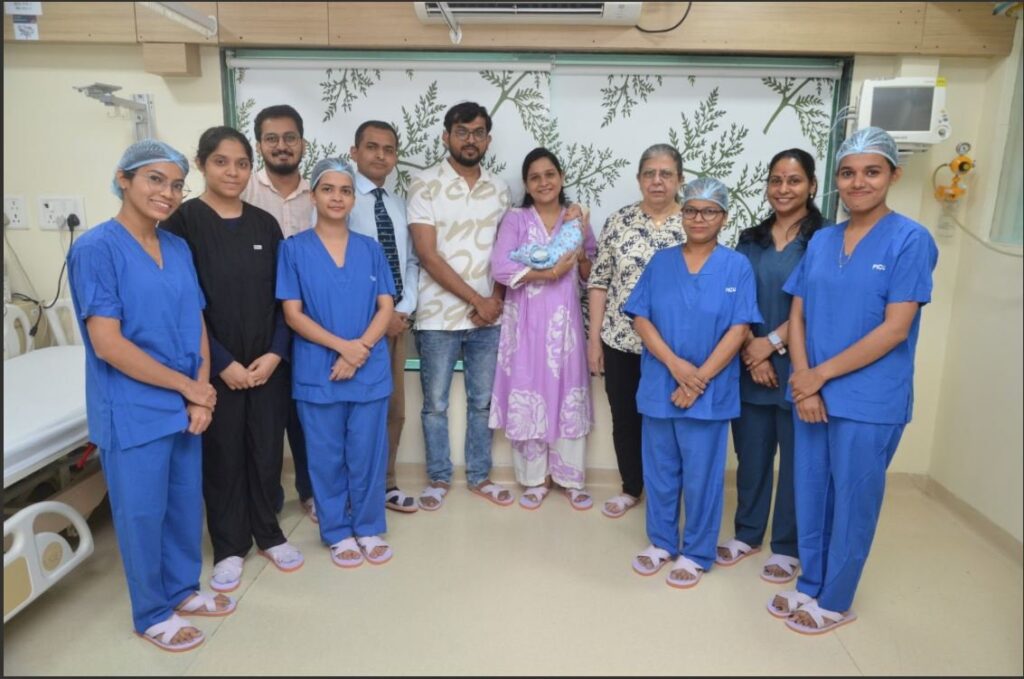
The prematurity and low birth-weight with Tracheo-oesophageal fistula (TEF) is a rare congenital condition which results to less than 50% chance of survival
L-R Dr Fazal Nabi, Mr Tushar, Mrs Trupti with baby, Dr Nargish Barsiwala, Dr Rajani Prajish
Jaslok Hospital and Research Centre in Mumbai, in a rare and complex case involving surgical and intensive care management, successfully treated a 30-week-old premature infant born with low birth weight (1.3 kg) and a Type C Tracheo-oesophageal Fistula (TEF). This congenital condition causes an abnormal connection between the windpipe and the food pipe, leading to excessive salivation and a high risk of choking and lung infection. The medical team at Jaslok Hospital performed a single-stage corrective surgery followed by oesophageal dilatation, marking a first-of-its-kind achievement in such a delicate case. Thanks to the coordinated efforts of the multidisciplinary team, the baby is now stable, is exclusively breastfed, weighs 1.8 kg, and is ready to be discharged.
Born in Vapi, Gujarat, the infant faced life-threatening complications due to the condition, and the parents contacted Dr Fazal Nabi, Director Paediatrics at Jaslok Hospital for higher treatment options. Considering the complexity of the case Dr Fazal Nabi himself travelled to Vapi to fetch the baby to ensure the safety during the transport and the baby was brought to Jaslok Hospital under his expert monitoring with artificial ventilation. Baby was immediately admitted to the Paediatric Intensive Care Unit (PICU), where Dr. Fazal Nabi took charge of his treatment. On arrival, the baby was placed on ventilator support, given haemodynamic stabilization with inotropes, and started on intensive sepsis management.
Later, pediatric surgeon Dr. Nargish Barsivala, a renowned Paediatric Surgeon at Jaslok Hospital was consulted who advised the most appropriate approach will be a one-stage surgery once the baby is stable. On the 3rd day, Dr Barsivala performed a one-stage corrective surgery, involving ligation of the fistula and end-to-end oesophageal anastomosis, after which the baby was moved to the intensive care unit. In the period following the surgery, the team faced another problem of intestinal movement. Because of prematurity and low birth weight the intestines were not moving properly. Baby was on (NG) Nasogatric tube feeding along with partial TPN. The baby had problems of swallowing also. Nasogastric Tube Feeding was given for about a month and then a decision was taken for performing Feeding Gastrostomy and the NG tube was removed.
However, even after a month, the baby continued to have difficulty swallowing. To address this challenge, a gastrostomy procedure was performed. The team opted for a high-risk oesophageal dilatation procedure using the smallest available dilator. Dr. Pankaj Dhawan, Consultant Gastroenterology at Jaslok Hospital carried out this delicate procedure, with crucial support from the Paediatric Intensive Care Unit, led by Dr. Fazal Nabi along with Dr Barsivala and Anaesthesia team. Gradually, the baby began swallowing on his own, leading to the removal of the NG tube.
Dr. Fazal Nabi, Director – Paediatrics, Jaslok Hospital & Research Centre, said, “When the baby was brought in, he was struggling — tiny, fragile, and in urgent need of care. From stabilising him on arrival to managing post-surgical complications, every step had to be timed and tailored. The oesophageal dilatation was particularly challenging, but the team worked in perfect sync. Watching him now, feeding on his own and ready to go home, is a reminder of why we do what we do. It was a team effort from start to finish, and I am grateful for the critical support”
Dr. Nargish Barsivala, Consultant – Paediatric Surgery, Jaslok Hospital & Research Centre, said, “Operating on a premature baby weighing just over a kilo is never easy. The tissues are extremely delicate, and the margin for error is almost zero. But given the nature of the condition, waiting wasn’t an option. We decided to go ahead with a single-stage repair, knowing the risks but also the long-term benefits. The successful outcome was made possible by the precise surgical expertise, expert anaesthesia support by Dr Rajani Prajish and assisting help from Dr Kotawala and the surgical residents.
Expressing gratitude, the Mrs Trupti mother of the baby said, “My baby is a precious baby born after 8 years of marriage with IVF support. When my baby was born so early and so fragile, I feared the worst. However, the care and dedication shown by the doctors and staff at Jaslok Hospital gave me hope. I truly believe that without their expertise and compassion, my child would not be here today.”
Jaslok Hospital’s Chief Medical Officer Dr Milind Khadke, mentioned “It is the clinical excellence and cutting-edge technology behind saving a 30-week premature baby with Tracheo-oesophageal fistula—a rare, life-threatening condition. Despite low birth-weight and under 50% survival odds, the landmark surgery showcases the hospital’s advanced neonatal care and surgical expertise, achieving a remarkable medical breakthrough.”
The family is now receiving comprehensive guidance on caring for the premature infant at home, including safe feeding practices, medication schedules, and vital warning signs to watch for.
Got a story that Healthcare Executive should dig into? Shoot it over to arunima.rajan@hosmac.com—no PR fluff, just solid leads.





